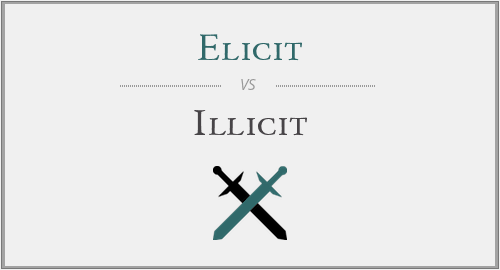Elicit
Elicit is a verb which means to get or extract something (a fact, answer, reaction, information) from someone. It can be used in both positive and negative sense. The word draws its roots from the mid-17th century Latin word elacere (e+lacere or out+entice).
A few examples –
· Somehow, I managed to elicit confidential information about exams from the maths teacher.
· The media have elicited some important information from our leaders by putting a lot of pressure.
· My sister-in-law elicited my maid’s family history in 10 minutes. I couldn’t do that in 2 long years!
· To elicit the truth from him on this issue, I had to lie and create a drama.
· After eliciting the much-awaited smile from the baby, we felt so accomplished.
· Elicitation is a great technique to have an interactive class. Many teachers follow this technique.
· He is a good elicitor. You can trust him to get all the needed information about the project.
Illicit –
Illicit is an adjective that means illegal or something that is forbidden by the law. The starting syllable ‘ill’ indicates the bad nature of the word and this could be an important factor for you to distinguish between elicit and illicit. Some synonyms of illicit are illegal, unlawful or illegitimate.

Origin of illicit – the word has come from the 16th century latin word illicitus (in+licitus or not+licit).
Examples –
· He was arrested for having illicit possession of arms.
· They are having an illicit affair for 3 years now.
· He illicitly purchased liquor worth 3 crore rupees.
· Some sportspersons consume illicit drugs for enhancing performance.
· The illicitness of your deeds sends chills through my spine.
Here are few sentences to help you understand the difference clearer. Speak them loud and understand the context to get the meanings in your head forever –
· After doing illicit activities for 2 years, he elicited sympathy from his family by framing stories.
· She illicitly gave him drugs to elicit secret information from him.
Note that in case of illicit, you cannot add -ed or -ing because it is not a verb. Also, the noun of elicit is elicitation, while the noun form of illicit is illicitness. These are some more good ways to get the right word when you hear someone say it.




Have a discussion about this article with the community:
Report Comment
We're doing our best to make sure our content is useful, accurate and safe.
If by any chance you spot an inappropriate comment while navigating through our website please use this form to let us know, and we'll take care of it shortly.
Attachment
You need to be logged in to favorite.
Log In